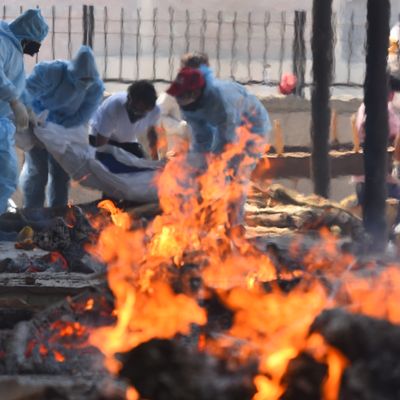
As India faces a catastrophic second wave of coronavirus infections, the United States has responded to pressure to provide vaccine materials and other aid to the nation of over 1.2 billion, where officials say they are close to running out of critical supplies, including oxygen and personal protective equipment.
On Sunday, the day after India clocked a world-record 346,000 new cases, National Security Council spokeswoman Emily Horne announced that the U.S. would provide “raw material urgently required for Indian manufacture of the Covishield vaccine,” which is the name of the AstraZeneca-Oxford shot produced in India. The U.S. will also provide protective gear, send advisers from the Centers for Disease Control, and boost funding to expand vaccine manufacturing by the pharmaceutical firm BioE, which the NSC estimates could help the company produce around 1 billion vaccine doses by the end of next year.
The decision was a major reversal of the American ban on exporting vaccine materials — a policy which stems from the particularities of the Defense Production Act, invoked by Donald Trump and President Biden to ramp up the vaccine process. When asked on Thursday why the U.S. would not end the policy to help stop the unprecedented surge of cases in India, Ned Price, a State Department spokesman, borrowed an approach from the previous administration, telling reporters that “the United States first and foremost is engaged in an ambitious and effective and, so far, successful effort to vaccinate the American people.”
The message was not received well in the pharmaceutical-manufacturing capital of the world, where less than 10 percent of Indians have received a single dose. “By stockpiling vaccines & blocking the export of crucial raw materials needed for vaccine production, the United States is undermining the strategic Indo-US partnership,” tweeted Milind Deora, a politician from Mumbai. Price’s comment came on the same day that the Biden administration hosted a virtual summit to restore the American commitment to combat climate change — a coincidence that was noted by Ulka Kelkar, director of the climate program at the India office of the World Resources Institute. “This is pathetic,” she tweeted. “Is this what the U.S.’ “leadership” in the climate crisis will look like?”
As India continues to break new caseload records day after day, experts worry that the nation is still underreporting its coronavirus cases and deaths. “It’s a complete massacre of data,” Bhramar Mukherjee, an epidemiologist at the University of Michigan, told the New York Times. “From all the modeling we’ve done, we believe the true number of deaths is two to five times what is being reported.” According to a Times survey of deaths in the city of Bhopal over a 13-day span in mid-April, cremation centers and burial grounds showed evidence of over 1,000 coronavirus deaths, compared to just 41 reported by city officials. In one horrifying case in a crematorium in the city of Surat, steel pipes in two of the facility’s chimneys melted from constant use. “We try to control our emotions,” Kamlesh Sailor, the president of the facility, told the Washington Post. “But it is unbearable.”






























